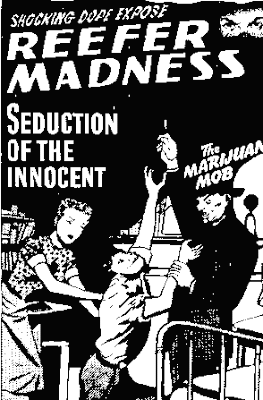
I'll be the first person to admit that drug users are victims of disease and should be treated as such. The prison system isn't meant to and is not equipped to handle drug users, and the fact that it is forced to only helps to stimulate bigger issues, no pun intended.
But when are we going to stop with these types of articles:
Recovery High School A 'Soft Landing' For post-Rehab Teens
Here's the lead:
It was Halloween night when 12-year-old Lucy Gross picked up her first marijuana cigarette, starting a spiral from which she is still struggling to recover.
And the cliches keep right on coming:
"I tried it and I liked it and it made me feel independent and it made me feel more grown up, more mature," Lucy said.
And coming:
By the time she was 15, the Gloucester, Massachusetts, teen was drinking, using cocaine and taking a variety of other pills, including Vicodin and Oxycontin. Her parents were worried. Even she knew she needed help.
I'm not trying to get down on Lucy, or her story. Her recovery is a positive thing, and I hope she stays strong. My point is this--telling these tales as the same old static-cautionary-Go Ask Alice-bullshit is not helping the problem. Neither is saying things like this:
As long as there's drugs you're gonna need a recovery high school. Until you've eradicated drugs, then you can stop having to help the adolescents. Drugs are in every school.
That's from the principal of Lucy's recovery high school, who obviously doesn't believe in personal responsibility, logic, or science. Hopefully she will read the article and see this fact:
According to SAMHSA, more than 70 percent of adolescents who get treated [in rehab] have a co-occurring psychiatric disorder. Lucy was no different. In sixth grade she was seeing a school counselor and behavioral specialist. By high school, she had a diagnosis of depression and was suffering from anxiety.
Saying that we'll need recovery high school's until drugs are eradicated is the same as saying we'll need them until teenagers with drugs issues are eradicated--you're not fighting the problem, you're fighting the results of the problem.
I'm not blaming Lucy, or even the principal. As long as media coverage and our collective conscience continues to think in this manner:

we'll continue to ignore the needs of a large sector of society that needs help and support, not fear-mongering and blame-shifting.
More soon.
JS

Please tell me you've seen Reefer Madness the Musical. Please.
ReplyDeleteI hear what you're saying, but drug use and addiction can become genuine and independent problems after the "core" issues in a person's psyche have had time to run wild with the person's emotional existence, manifesting (in some people) in some level of drug dependence. There is value and need in addressing the "addiction," if you choose to call it that, because for many users, drugs and the drug culture may have seeped into many areas of their lives-- their friends may be drug users, the places they're comfortable may be places people use drugs, drug use may have become the manner in which they cope with trouble and try to have fun-- and asking a teenage kid to suddenly perceive all of this and then change it all is asking for quite a bit. Some can probably pull it off, many others will not.
ReplyDeleteThe cliches you described may be mere "cliches," but read them again-- don't they sound about like what you'd expect a fifteen year old destined to develop a dependency to experience?
Finally, all those life skills you mentioned-- logical thinking, personal responsibility, using scientific research to inform one's decisions-- are good and important, but I'd guess that only a plurality of people (at most) learn to integrate all those habits into their lives while still teenagers. The rest will gain bits and pieces from that list during their twenties and thirties, a little at a time. For the sixteen year old fresh out of rehab or coming off a harrowing experience like being arrested, overdosing, failing classes-- the sort which may cause such a person to evaluate the state of their lives-- the process of reconstructing their lives away from the drug world they know may be a plenty large task for the first few years. Having the support of an entire school that is drug free may help a lot.
At the least, having such a school does not hurt you or any other person.